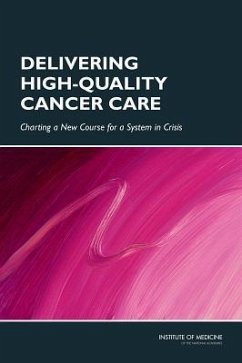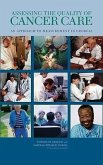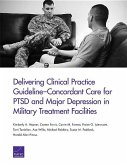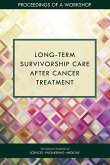In the United States, approximately 14 million people have had cancer and more than 1.6 million new cases are diagnosed each year. However, more than a decade after the Institute of Medicine (IOM) first studied the quality of cancer care, the barriers to achieving excellent care for all cancer patients remain daunting. Care often is not patient-centered, many patients do not receive palliative care to manage their symptoms and side effects from treatment, and decisions about care often are not based on the latest scientific evidence. The cost of cancer care also is rising faster than many sectors of medicine--having increased to $125 billion in 2010 from $72 billion in 2004--and is projected to reach $173 billion by 2020. Rising costs are making cancer care less affordable for patients and their families and are creating disparities in patients' access to high-quality cancer care. There also are growing shortages of health professionals skilled in providing cancer care, and the number of adults age 65 and older--the group most susceptible to cancer--is expected to double by 2030, contributing to a 45 percent increase in the number of people developing cancer. The current care delivery system is poorly prepared to address the care needs of this population, which are complex due to altered physiology, functional and cognitive impairment, multiple coexisting diseases, increased side effects from treatment, and greater need for social support. Delivering High-Quality Cancer Care: Charting a New Course for a System in Crisis presents a conceptual framework for improving the quality of cancer care. This study proposes improvements to six interconnected components of care: (1) engaged patients; (2) an adequately staffed, trained, and coordinated workforce; (3) evidence-based care; (4) learning health care information technology (IT); (5) translation of evidence into clinical practice, quality measurement and performance improvement; and (6) accessible and affordable care. This report recommends changes across the board in these areas to improve the quality of care. Delivering High-Quality Cancer Care: Charting a New Course for a System in Crisis provides information for cancer care teams, patients and their families, researchers, quality metrics developers, and payers, as well as HHS, other federal agencies, and industry to reevaluate their current roles and responsibilities in cancer care and work together to develop a higher quality care delivery system. By working toward this shared goal, the cancer care community can improve the quality of life and outcomes for people facing a cancer diagnosis.
Hinweis: Dieser Artikel kann nur an eine deutsche Lieferadresse ausgeliefert werden.
Hinweis: Dieser Artikel kann nur an eine deutsche Lieferadresse ausgeliefert werden.








